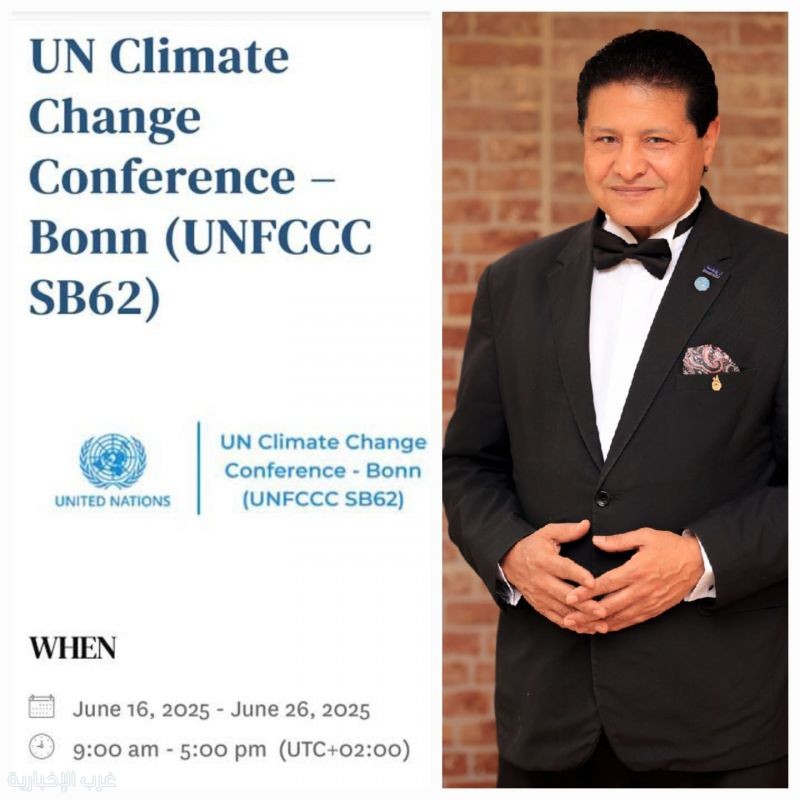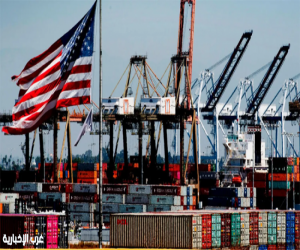

المصدر -
Between Hope and Political Pressure: What to Expect from the 2025 Bonn Climate Change Conference
The 2025 Bonn Climate Change Conference (SB62) is not merely a technical checkpoint, but a critical juncture in the global climate governance process. Taking place in Bonn, Germany, from June 16 to 26, this session convenes global negotiators to resolve outstanding issues from COP29 in Baku and lay the groundwork—both technical and political—for COP30 in Belém, Brazil.
This year’s Bonn Conference comes at a moment of increasing global uncertainty—amid intensifying geopolitical tensions, retreating climate finance commitments, and rising populist rhetoric—making it a litmus test for the international climate regime.
Ambassador Mostafa Sherbiny, head of the Climate Ambassadors Delegation, confirmed his official participation in SB62. He announced that he and his delegation will hold an official press conference on Monday, June 16 at 3:30 p.m. in Room 4, as listed in the official UNFCCC conference agenda.
In a statement to the Middle East News Agency, El-Sherbiny emphasized the significance of this year’s Bonn session:
“We arrive in Bonn amid alarming indicators of accelerating climate change. Meanwhile, some major economies are backsliding on their climate commitments, and the gap between scientific necessity and political delivery is growing wider. This increases the urgency for stronger involvement from non-state actors and civil society—especially climate ambassadors—who can help drive ambition from the ground up.”
Critical Issues on the Table at Bonn
1. Adaptation: Moving from Ambiguity to Accountability
The Global Goal on Adaptation (GGA) remains one of the Paris Agreement’s most underdeveloped components. Though enshrined in 2015, the goal of “enhancing adaptive capacity, resilience, and reducing vulnerability” is still evolving into measurable action.
At COP28 in Dubai, parties adopted a GGA framework with targets across water, health, agriculture, biodiversity, infrastructure, and cultural heritage. Negotiators in Bonn are now working to refine a shortlist of 490 indicators (down from an initial 9,000) to track progress—evaluating their feasibility, contextual relevance, and alignment with social equity.
2. Mitigation: Momentum in Decline
Despite the existence of a Mitigation Work Programme (MWP), global ambition remains underwhelming. Sectoral dialogues have failed to spark meaningful commitments or implementation. The first Global Stocktake (GST1) called for a transition away from fossil fuels, but many nations are resisting converting this political will into enforceable actions.
3. NDC3: A Race Against the Clock
By February 2025, all countries are expected to submit their third round of Nationally Determined Contributions (NDC3). As of today, only 22 countries have done so, putting pressure on others ahead of a second deadline in September 2025. These submissions will form the basis of a synthesis report by the Paris Agreement Secretariat—crucial for tracking progress toward the 1.5°C goal.
4. Transparency: The Paris Agreement's First Stress Test
For the first time, countries are reporting under the Enhanced Transparency Framework (ETF). Over 110 nations have submitted Biennial Transparency Reports (BTRs) covering their NDCs, support received or provided, and capacity-building needs. In Bonn, these reports will be reviewed and discussed to identify strengths, weaknesses, and data gaps.
5. Climate Finance: Crisis of Trust Persists
At COP29, parties agreed to a new New Collective Quantified Goal (NCQG) of $300 billion per year. Yet many developing countries see this figure as insufficient and lacking a credible delivery roadmap.
While finance is not expected to dominate the Bonn agenda, side discussions may emerge around Brazil’s “Baku–Belém roadmap,” which seeks to increase the finance ceiling to $1.3 trillion annually by 2030.
6. Gender and Human Rights: Negotiating Under Pressure
A new Gender Action Plan is due following its extension at COP29 in Baku. However, political resistance from certain countries—particularly those opposing terms such as “gender” or “intersectional discrimination”—poses a challenge. If negotiators fail to reach inclusive language, the substance of the action plan could be weakened, undermining participation of women and marginalized groups.
7. Logistics for COP30 in Belém
Belém, located in the heart of the Amazon, presents unique logistical challenges. In Bonn, discussions will center around infrastructure readiness, expected delegate numbers, and possible access limitations. Brazil is preparing for a potentially record-breaking turnout exceeding 80,000 participants.
8. Brazil’s Role: A Return to Climate Leadership
Brazil’s COP30 presidency signals a renewed commitment to climate leadership, as the country integrates its finance and agriculture ministries into the negotiation process. Brazil is prioritizing protection of the Amazon, Indigenous rights, and delivering tangible outcomes—not just rhetoric.
This assertive leadership style is already shaping the tone of negotiations in Bonn.
Message from the Climate Ambassadors Delegation
Ambassador El-Sherbiny stressed the delegation’s key priorities:
“We are here to reinforce the outcomes of COP28, push for implementation over promises, and help rebuild trust between the Global North and South. Our focus includes innovative climate finance tools, community-based adaptation, and youth and women’s empowerment.”
He further urged donor nations and international financial institutions to redirect climate finance toward real, scalable projects that strengthen the resilience of vulnerable countries—particularly in Africa and small island developing states (SIDS).
Looking Ahead to COP30 in Brazil
El-Sherbiny concluded:
“Bonn must be more than a procedural checkpoint—it must become a consensus-building platform that sets a clear and ambitious direction for COP30. We need real action beyond declarations. The ball is now in the court of governments, institutions, and multilateral finance systems.”
The 2025 Bonn Climate Change Conference (SB62) is not merely a technical checkpoint, but a critical juncture in the global climate governance process. Taking place in Bonn, Germany, from June 16 to 26, this session convenes global negotiators to resolve outstanding issues from COP29 in Baku and lay the groundwork—both technical and political—for COP30 in Belém, Brazil.
This year’s Bonn Conference comes at a moment of increasing global uncertainty—amid intensifying geopolitical tensions, retreating climate finance commitments, and rising populist rhetoric—making it a litmus test for the international climate regime.
Ambassador Mostafa Sherbiny, head of the Climate Ambassadors Delegation, confirmed his official participation in SB62. He announced that he and his delegation will hold an official press conference on Monday, June 16 at 3:30 p.m. in Room 4, as listed in the official UNFCCC conference agenda.
In a statement to the Middle East News Agency, El-Sherbiny emphasized the significance of this year’s Bonn session:
“We arrive in Bonn amid alarming indicators of accelerating climate change. Meanwhile, some major economies are backsliding on their climate commitments, and the gap between scientific necessity and political delivery is growing wider. This increases the urgency for stronger involvement from non-state actors and civil society—especially climate ambassadors—who can help drive ambition from the ground up.”
Critical Issues on the Table at Bonn
1. Adaptation: Moving from Ambiguity to Accountability
The Global Goal on Adaptation (GGA) remains one of the Paris Agreement’s most underdeveloped components. Though enshrined in 2015, the goal of “enhancing adaptive capacity, resilience, and reducing vulnerability” is still evolving into measurable action.
At COP28 in Dubai, parties adopted a GGA framework with targets across water, health, agriculture, biodiversity, infrastructure, and cultural heritage. Negotiators in Bonn are now working to refine a shortlist of 490 indicators (down from an initial 9,000) to track progress—evaluating their feasibility, contextual relevance, and alignment with social equity.
2. Mitigation: Momentum in Decline
Despite the existence of a Mitigation Work Programme (MWP), global ambition remains underwhelming. Sectoral dialogues have failed to spark meaningful commitments or implementation. The first Global Stocktake (GST1) called for a transition away from fossil fuels, but many nations are resisting converting this political will into enforceable actions.
3. NDC3: A Race Against the Clock
By February 2025, all countries are expected to submit their third round of Nationally Determined Contributions (NDC3). As of today, only 22 countries have done so, putting pressure on others ahead of a second deadline in September 2025. These submissions will form the basis of a synthesis report by the Paris Agreement Secretariat—crucial for tracking progress toward the 1.5°C goal.
4. Transparency: The Paris Agreement's First Stress Test
For the first time, countries are reporting under the Enhanced Transparency Framework (ETF). Over 110 nations have submitted Biennial Transparency Reports (BTRs) covering their NDCs, support received or provided, and capacity-building needs. In Bonn, these reports will be reviewed and discussed to identify strengths, weaknesses, and data gaps.
5. Climate Finance: Crisis of Trust Persists
At COP29, parties agreed to a new New Collective Quantified Goal (NCQG) of $300 billion per year. Yet many developing countries see this figure as insufficient and lacking a credible delivery roadmap.
While finance is not expected to dominate the Bonn agenda, side discussions may emerge around Brazil’s “Baku–Belém roadmap,” which seeks to increase the finance ceiling to $1.3 trillion annually by 2030.
6. Gender and Human Rights: Negotiating Under Pressure
A new Gender Action Plan is due following its extension at COP29 in Baku. However, political resistance from certain countries—particularly those opposing terms such as “gender” or “intersectional discrimination”—poses a challenge. If negotiators fail to reach inclusive language, the substance of the action plan could be weakened, undermining participation of women and marginalized groups.
7. Logistics for COP30 in Belém
Belém, located in the heart of the Amazon, presents unique logistical challenges. In Bonn, discussions will center around infrastructure readiness, expected delegate numbers, and possible access limitations. Brazil is preparing for a potentially record-breaking turnout exceeding 80,000 participants.
8. Brazil’s Role: A Return to Climate Leadership
Brazil’s COP30 presidency signals a renewed commitment to climate leadership, as the country integrates its finance and agriculture ministries into the negotiation process. Brazil is prioritizing protection of the Amazon, Indigenous rights, and delivering tangible outcomes—not just rhetoric.
This assertive leadership style is already shaping the tone of negotiations in Bonn.
Message from the Climate Ambassadors Delegation
Ambassador El-Sherbiny stressed the delegation’s key priorities:
“We are here to reinforce the outcomes of COP28, push for implementation over promises, and help rebuild trust between the Global North and South. Our focus includes innovative climate finance tools, community-based adaptation, and youth and women’s empowerment.”
He further urged donor nations and international financial institutions to redirect climate finance toward real, scalable projects that strengthen the resilience of vulnerable countries—particularly in Africa and small island developing states (SIDS).
Looking Ahead to COP30 in Brazil
El-Sherbiny concluded:
“Bonn must be more than a procedural checkpoint—it must become a consensus-building platform that sets a clear and ambitious direction for COP30. We need real action beyond declarations. The ball is now in the court of governments, institutions, and multilateral finance systems.”










